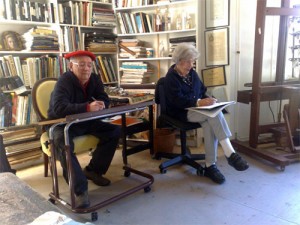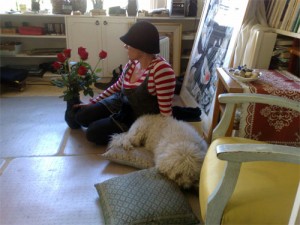Charles Blackman Interview
August 13, 2010
Today I interviewed Charles Blackman, at the home of Judy Cassab in the eastern suburbs of Sydney. The interview was for the Daily Telegraph where I work as visual arts writer.
By sheer happenstance, my timing could not have been better. Ten minutes before I left the office for the interview, which was to be about Blackman’s forthcoming exhibition, I found out that a big art heist at Darling Point was being investigated by the police, and that one of the stolen paintings was a Blackman titled Victoria and Moonlight. The police had already sent images of all the paintings to our photo desk, so I made sure I printed off Victoria and Moonlight before I left the office.
When I arrived at Judy Cassab’s elegant, ground-floor flat I was met by Ali Yeldham of the Arthouse Gallery (where Blackman’s exhibition was to be) and Marina Finlay. Marina is an artist and life model who has been close to Judy Cassab for many years. She was invariably the model in the years when Nora Heysen, Cassab and Margaret Woodwood drew together every week. These days, Marina models for Cassab and Blackman twice a month.
At the time I arrived, the two artists were taking a short break in their morning’s drawing. I went into the studio which occupies a room of the flat. Light streamed through a huge window and a CD of piano music was playing softly. Blackman was enjoying a cup of coffee and a slice of the incredibly rich chocolate cake he had brought with him. It was Cassab’s birthday in several days and she would be 90. As well as the cake, Blackman had brought his old friend a bunch of red roses. Cassab herself was just finishing a quick lie-down before she resumed drawing.
I told Blackman about the stolen painting and he looked carefully at the black and white print-out I had brought with me. He said straight away that if the stolen paintings were insured, an arrest would inevitably follow. If they were uninsured, there was “nothing anybody can do”.
“Clues are difficult to imagine. If they are insured, then head detectives or sergeants or whatever in the police will track these people down by clues you wouldn’t even think about. That’s what they’re paid for,” Blackman said.
I asked him what he would say to the thief or thieves.
“Unfortunately I don’t know who they are,” Blackman said, perfectly reasonably.
Hastening to make myself clearer, I said that I meant ‘what would he say to them in the Telegraph the next day?’.
“Did you regret that you were born?” Blackman said.
“No,” I said.
“No, I’m saying that to the thief,” Blackman said. He must have thought I was dim.
“If I was a policeman I would [say that to the thief]. ‘Do you regret you were born? Are you getting revenge on your mother in law who you hated?’ Because people who steal things have a reason for doing it.
“Before they know it, they’re bending over the back of their car with the handcuffs on, and that’s the end of them. I hope so.”
By now, Cassab had come into the studio. She is such a lady, and always charming and beautifully dressed. She waited so politely while I finished talking to Blackman, then Marina suggested “another pose” and sat on cushions on the floor with her dear little dog, Max. Marina took the vase of roses and held it as part of her pose. The two artists took up their sketchbooks and black pens, and very quietly began to draw.
I farewelled the two artists and returned to the office, very aware that I had just been present when two of the legends of Australian art were having a quiet morning’s sketch over a cup of coffee and a piece of chocolate cake.
| Print article | This entry was posted by Elizabeth Fortescue on August 13, 2010 at 7:34 pm, and is filed under Uncategorized. Follow any responses to this post through RSS 2.0. You can skip to the end and leave a response. Pinging is currently not allowed. |


